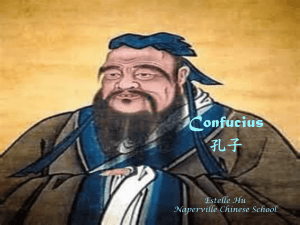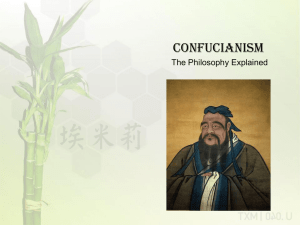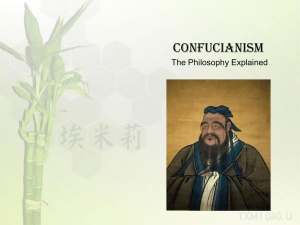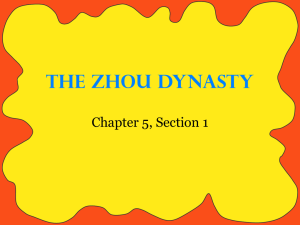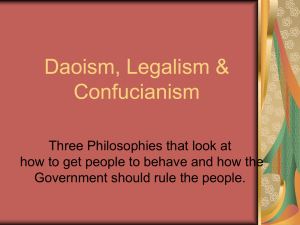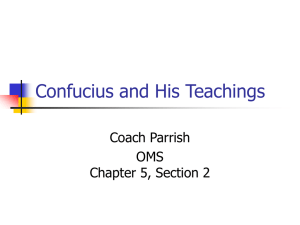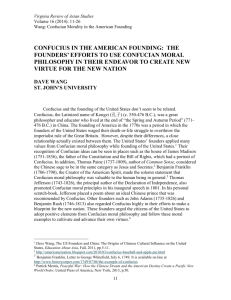Learning-to-Master-the-Universe-and-to-Transform
advertisement
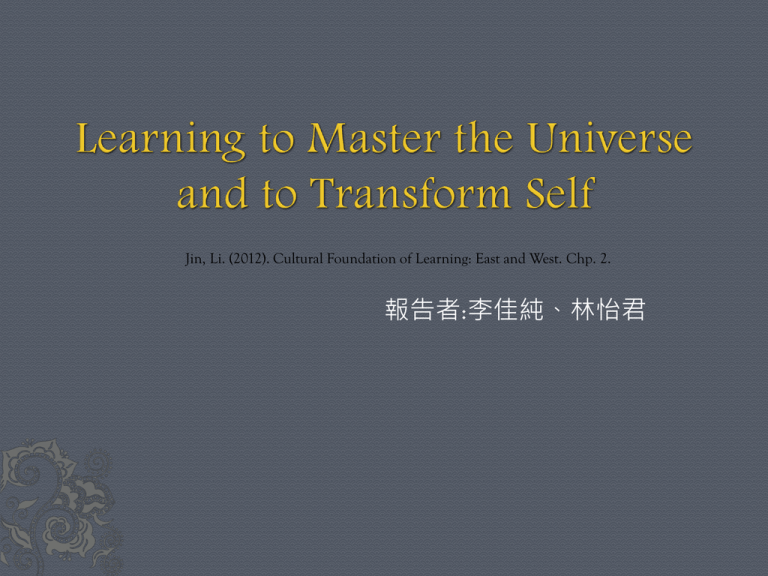
Jin, Li. (2012). Cultural Foundation of Learning: East and West. Chp. 2. 報告者:李佳純、林怡君 背景 雖然許多對於文化的觀察已經發現到東西方的 差異,但很少探索學習方法上的差別。 目的 概述東西方文化在學習上的基本面貌 藉著追溯東西方不同知識傳統的脈絡,來去建立用 以檢驗和解釋實徵性研究發現的基礎框架。 •知識產生的歷史模式是相似的 •興趣及假設前提卻是不同的 對知識的追求 產生關於世界 和人類生活的 新理念 思想和理論 修改現有思維 的典範 時代變化 Know the World、Certainty of Knowledge、 Mind and Its Wonders、Examined Life、 The Western Learner 西方必要的哲學觀念 知識論(認識論) Epistemology 探索知識的本質、起源和範圍的哲學分支 知識是甚麼?知識如何獲得?我們如何知道我們 知道甚麼? 這種方法已經對知識的問題設想好了隱含的合 理性或對知識的概念正確性的前提假設,故這 種假設無法在東西方文化上共享。 本章節主旨 把重點放在東西方文化對學習的見解 方法 從對東西方文化來說,皆為更普遍都可運用的問題 開始。 What are human to know? 衡量標準放在What的概念 探索的關鍵問題是甚麼? 對於人來說知道甚麼是重要的? 應該要努力最先知道甚麼? 外部世界 (External World) 外部世界 與內部世界相對 亞里斯多德:「哲學起源於對外部世界的驚奇, 人可以通過外部世界改變內部世界。」 人被設想為一位Knower,而外部世界是人去理 解的事物。 直到現在,外部世界的概念已經擴展。 物理世界精神上的世界包羅萬象的世界 如何接觸探索外部世界 感官所能接觸的內容:感覺與料(sense-data) 關心的事弄清楚”感覺與料”如何與一個整體相關和起作 用。 在正常情況下看一顆番茄,我們在心中會形成該番茄的一個 影像;那個「影像」是紅色的且圓狀的。而此「心像」 (mental image)正是感覺與料的一個示例。 揭露事物本質 找出導致和驅使表面事物(surface things)的潛在深厚力量 找出在不穩變或多變的事物背後的穩定特質 揭露自然世界的本質 早期希臘思想家想知道生理世界是由甚麼組成 以及他是如何運作的 世界組成的物質: Thales(水) Anaximander(無限者) Heraclitus(火) Anaximanes(空氣or蒸氣) Empedocles(氣、火、水、土) Anaxagoras(無限可分的粒子) 揭露自然世界的本質 早期希臘思想家想知道生理世界是由甚麼組成以及 他是如何運作的 世界如何運作: 推測天體以完美的正圓移動:Pythagoras地球是球形 Heraclitus:所有的事物都是流動的從感官認知的觀點認為大 自然不斷改變,感官認知是可靠。 對Heraclitus的反擊主張:認為沒有任何事物會來自虛無, 經驗存在的事物中也不會消失無形。認為我們的感官使 我們對世界有不正確的認識,這種認識與我們的理智不 符。 從理性的角度認為沒有一件事物會改變,感官認知不 可靠。 小結 真正的科學精神 利: 消除致命的疾病、改善健 康、減少饑荒、增加生產 的效率、創造財富等 對外部世界都表現出好奇心和感興趣 對了解世界表現出disinterested effort 求真、求實的精神 弊: 核武器、工業污染…等加速 地球資源消耗殆盡速度 希臘晚期的思想家藉著對宗教的虔誠來作 一些行動不再僅僅理解生理世界 17世紀現代科學復興:產生利與弊 除了對外部世界的基本興趣外,進一步的 藉著對追求知識論中的關鍵問題來奠定其 知識的正確性 How do we know what we Know? How does knowledge differ from belief? How certain is human knowledge? 理性主義 認為人的理智是世間所有知識的泉源 理智把持有秩序的世界和讓我們理解世界 理性指能夠識別、判斷、評估實踐理由以及使 人的行為符合特定目的等方面的智能。 通過論點與具有說服力的論據發現真理,通過 符合邏輯的推理而非依靠表象而獲得結論,意 見和行動的理由。 人類首先本能地掌握一些基本原則,如邏輯和 幾何法則,隨後可以依據這些推理出其餘知識。 邏輯(Logic) 論證的根基、青睞使用演繹法並使用其去證明 物理關係的存在和說服肉眼看不到的事物 藉此探索關於世界以察覺不證自明的事物來獲 得確定的知識,並稱其為真理。 後使用演繹法推理得出定理或其他邏輯性推論。 數學 其為肯定和絕對的 「永恆確切的真相並超越感官來理解的世界。」 蘇格拉底和柏拉圖也是其提倡者 「幾何學迫使人去看存有(being)…對幾何知識來說, 它是永恆的。」 數學和邏輯 在古希臘也被用於榮耀上帝和不朽的靈魂 但在隨後的幾世紀,被用於證明上帝的手段 亞里斯多德的不動的動者(unmoved mover) 17世紀大部分的科學家,都是依賴此方法去探 索外部世界。 Ex.哥白尼、克卜勒、萊布尼茲、牛頓 17世紀,培根提出歸納法被引進和被西方接受 18世紀,洛克提出所有的知識來自經驗的想法 理性(Reason) 再次因康德的理論獲得哲學上的主導位置 <純粹理性批判>辨別知識是否來自先驗知識 人類的心智結構會理性的篩選經驗(ex.用甚麼色的眼 鏡看待世界),故人有一個看待和處理世界的先驗方 康德他認為所有的知識都是隨著經驗開始的,但是並 法。 非都是源自於經驗的。 康德的無上命令(categorical imperative): 「依你無矛盾 一切都是感官作用而來,並不承認如之前哲學家所提 的人有先天的觀念。 地認定所有其他人在相同情形下亦當如是而為的方 「先驗」顧名思義乃是「先」於經「驗」的意思;然 式來做」 而「先」在此很容易被誤解為「在時間上先於經驗」, 其實它應該更適當的說是「作為經驗的先決條件」, 也就是使經驗成為可能的先決要素與基礎。 小結 知識標準 在過去三個世紀以來變動很大,影響現代知識 論在知識的確定性上陷入疑慮。 作者認為“how certainly we know anything”仍然可 以作為一個評估可靠性的基本問題 沒有一個評估架構是絕對正確的 因此,數學和邏輯方法仍然會是西方不容置疑 的核心角色 在西方學習的意義 What in us does the knowing? Human faculty : intellect、mind,在心理學中則 被視為Human capacity;最近在神經學中被視為 人類大腦迴路。 也就是智慧被認為伴隨著這些能力來去依循邏 輯去比較、分析、歸納。 蘇格拉底和柏拉圖 蘇格拉底認為人的mind在出生時就具有知識, 所以知識是回想來的,不是學習來的。 少年奴隸的例子學習並非單純囤積知識材料,而 蘇格拉底證明的不是人類知識本身,而是我們跟隨邏輯和論證的 是師生之間共同尋求正確答案的過程, 能力。 柏拉圖認為人的mind能理解所有事物都有其概 念或形式,也就是人的mind擁有對所有事物具 體想法的分類。 Ex.狗 作者認為柏拉圖只是將人類的認知能力放在一個分層結構中去 分類事物,從具體到增加更多抽象的類別,而人也有能力當他 們發展成熟時,認知所有高或低的認知水平類型。 蘇格拉底和柏拉圖對Mind的想法 在笛卡爾時達到巔峰 「Cogito, ergo sum」人類藉著後設認知在自己思考 上的覺察來被證明。 Mind的先天立場 Chomsky聲稱人類語言也是與生俱來的能力 現代科學也提供與生俱來的能力的證據 蘇格拉底、柏拉圖和阿那克薩哥拉 提出mind是生理變化的主要原因 也就是心態可以使事情改變 此想法為最終的神學奠定了基礎 聖奧古斯丁 認為時間是主觀的;它在人的Mind中被期待、 考慮和記憶著。 人的Mind是神創造的 洛克對上述先天立場的反駁 主張我們的知識,是來自經驗。 George Barkeley 認為我們只是查覺事物的特性,而非事物本身。 認為Mind是一塊白板 如前述的康德的先驗主義,又為先天理論扳回 甜愉快、苦討厭、寒冷、高溫都存在Mind中 一城;並平衡了先天理論和經驗論雙方的主張。 David Hume 認為思考和推理處理來自於我們形成此想法的經驗 因果關係的知識,來自於我們推論兩件事看起來不斷結 合在一起的信念。 小結 現代心理學建立是為了研究心理功能和其 清楚的行為 長期下來,已建立了一些心理過程的基本 結構 但在能力的概念外,心理過程並非一致的 文化、種族、性別都會有所影響不同的Mind 蘇格拉底 「未經審視的生活不值得度過」 非常堅定地在質疑所有常規的概念 Ex.與歐西弗洛的對話最後達到他對於”虔誠”的一般性 定義 不只體現良好的思維,還表現出西方的批判性思維 許多古希臘思想家,直到現今的西方社會,都繼承 了這個辯證的探究精神 Ex.盧梭的<愛彌兒>影響現今的教育 漸進式教育、Reggio Emilia 小結 現今西方教育 有一個核心目標教導學生如何批判思考、如何去自 己思考、對所學提問、以及挑戰現存的權威知識 證明西方知識傳統恆久特性的例子:學校座右銘 哈佛【讓真理與你為友】、耶魯【光明與真理】、牛津 【上主是我的亮光】、劍橋【此地乃啟蒙之所、智識之 源】真理和光明傳達基本知識的相似意義 麻省理工【心和手】、史丹佛【讓自由之風勁吹】、芝 加哥【提升知識,以充實人生】、多倫多【像大樹一樣 茁壯成長】重視Mind、開闊、自由和探究的批判精神 哲學家們儘管對於學習者的概念並不引人注目, 但仍關注教育的需要;16世紀以來的教育家不 但領導幾十年的美國教育改革,且都強調教育 的重要,並創造新的教育形式。 並對學習者有所期理想特徵的前提假設,作者 整理歸納出四者西方智力傳統學習者的特徵和 學習過程,以方便進行文化之間的對比。 1. 2. 3. 4. 擁有一個好的Mind和妥善的運用它 辨別出擁有較佳能力潛力的學習者 Fun之於美國教育是重要的,以引導學生探索外部 世界的內在動機。 擁有天生的好奇心、興趣、趣味性和內在的 享受 探究世界 維持廣闊的心態和自由探索的精神是重要的。 體現在個人見解、創造力、及挑戰既有知識和專 家或老師的權威,來表現自我上。 最終學習目標為了解和掌握世界 學習者本身會受Mind(推 理、智能)和智力的影響 (好奇心、興趣、內在動 機) 藉由學習者自我表達和挑 戰的態度來探索外部世界 學習者藉由探索來追求外在世界 探索外部世界 的結果會兩種 完善自我、以天下為己任、學習美德、行勝於言 The Confucian learning tradition is the predominant tradition throughout Chinese (as well as much of Japanese, Korean, and Vietnamese) history. Confucius is the center of Chinese culture. Without Confucius, there would be no Chinese culture. The most important legacy that Confucius left is not these compilations, but rather his own teaching on how to be a person, bow to learn, and how to achieve human excellence. For Confucius, the most important purpose of human life is to self perfect, or self-cultivate , socially and morally. The power of Confucius does not focus on the political system, not even political careers of his pupils, but the fundamental question that each human being has to face: How do I live my life? What kind of a person do I want to be? These questions concern the very fact that all humans survive, develop, and flourish in social relationships. Confucius’ vision of human lives was "not simply one to be understood, and accepted, modified, or rejected on the basis of its congruence with the world ‘objectively’ perceived ....On the contrary, his vision was one that had to be felt, experienced, practiced, and lived. He was interested in how to make one's way in life, not in discovering the ‘truth’” Five cardinal human relationships: 五倫 (1) Parent-child relationship:父子 (2) Sibling relationships:兄弟 (3) Husband-wife relationship:夫婦 (4) Basic economic relationship:君臣 (5) Friendship:朋友 Confucius taught five virtues corresponding to these relationships for one to learn and four general moral principles for all to strive for. Five relationships v.s. five virtues Relationship Virtues Parent-child 慈愛、孝 Sibling 悌 Husband-wife 敬 Basic economic 忠 Friendship 信 Confucius articulated four further moral principles that transcend specific relationships, applicable to common life circumstances. Four general moral principles: 四維 (1)Propriety:禮 (2)Rightness:義 (3)Integrity:廉 (4)Sense of shame:恥 For Confucius, the highest level of selfcultivation is the larger concept of ren.( 仁 ) Ren has been translated as human goodness, benevolence, humanity, humanheartedness, and most recently authoritative conduct. Confucius preserved a special term for those who commit themselves to the process of and follow the way of ren: 君子 Confucius spoke of several categories of persons, all of whom display human goodness through dedicated learning. junzi for Confucius not only cultivate themselves but also help others achieve this height of human excellence. Scholar apprentice (士) is the one who has achieved some virtues and understood the moral principles. This person has also moved beyond the family, kin, and local community, and is committed to pursue ren. Still, much learning and selfcultivation remain ahead. Compared to a scholar-apprentice, junzi is nearer to the ultimate goal of self-cultivation. Confucius pointed to an even “loftier human model,” namely the sage:聖賢 Sages are those who love, care for, and extend their benevolence to all. "Clearly such persons have extended their human feelings and thoughts to embrace the entire human race." Mencius highlighted four endowed human capacities, which he termed four germinations of human moral development: (1) 惻隱之心→仁 (2) 羞惡之心→義 (3) 辭讓之心→禮 (4) 是非之心→智 Each individual must make a great effort to learn and to self-perfect continuously in order to realize his or her full moral potential. 程顥、程頤: 宇宙萬物來自於天理,也包含人類的道德天性。 天理是知識、真理的來源,而知識在人的心中。 教育之目的是培養聖人,君子之學,必至聖人 而後己。不至聖人而自己者,皆棄也。 格物、致知、窮理是自我修養的途徑,窮究事 物道理,致使自心知通天理。 朱熹: 四書集注:大學、中庸、論語、孟子 studying books 讀書 was a very serious endeavor (in fact, the term study books became a general notion standing for education still commonly used today). 王陽明: 良知、致良知、知行合一: 良知為人之所固有,以致良知為指引人入 聖為賢之道路,更以知行合一來說明萬事 萬物之原理。 Despite their differences in emphasis, all Confucians still share the fundamental purpose as originally outlined by Confucius himself: learning to self-cultivate. Confucius' own teaching emphasized personal selfperfection toward ren through daily self-examination and practice. In serving the kings, junzi must assume the role of a bearer of moral responsibility as well as a moral teacher/advisor for those in power. This kind of upholding the moral principle by a single individual, courageous against the abuse of political power and insisting on reforming the ruler to seek ren, is the ultimate task for a Confucian learner, known as taking the world upon oneself. 《大學》八目: 格物、致知、誠意、正心、修身、齊家、 治國、平天下。 It is thus clear that learning in the Confucian way is not just for personal fulfillment, selfactualization, or personal gain in a practical sense; rather - and more importantly - it moves from an individual starting point and expands gradually to the large spheres of human life as a whole. Neo-Confucians felt strongly about this path toward sagehood (rather than personal achievement of junzi per se) was that almost all of them were court officials. They were called scholarofficials(士大夫), literally scholars-turned-into-officials - a uniquely Confucian elite that served the dynastic courts. Although the learning content has been broadened and the Western-style schooling established, the value of learning and the ways learners engaged in this process still remained quintessentially Confucian, as will be seen in the empirical research in later chapters. Seven core learning virtues: sincerity, diligence , endurance of hardship, perseverance, concentration, respect for teachers and humility. These are called virtues for two reasons: (1) They have long been part of Chinese moral discourse. (2) Parents, teachers, and society at large make concerted efforts to foster these learning virtues in children. Sincerity 誠心: Sincerity is a key virtue for Confucian leaning. It is the honest and authentic commitment that the person makes to him- or herself as the target of learning. Sincerity is regarded as the starting virtue for Confucian learning and prevails through the process. 例子:程門立雪 Diligence 勤奮: This course of action requires that one exerts oneself and resists any temptation to stray from the path or simply to give up in the face of obstacles. It emphasizes much time spent on learning. Diligence is also believed to increase familiarity, which in turn opens opportunities for mastery. Endurance of hardship 刻苦: Focuses on overcoming difficulties one is bound to encounter in learning. Difficulties in the Chinese context: (1) lack of resources for learning (e.g., poverty) (2) lack of time for studying. Not only do many Confucian learners not fear hardship, but they actually take pride in meeting the ordeal, thereby displaying their personal strength. 例子:鑿壁偷光 Perseverance 恆心: Concerns the lasting strength for learning from the beginning to the very end. Two key notions are stressed: (1) The belief that learning is a long and gradual process; no sudden insight or shortcut can replace this accumulative process. (2) The path is full of obstacles and distractions, which demands that one hold fast to the commitment. 例子:冉求曰:「非不說子之道,力不足 也。」子曰:「力不足者,中道而廢,今 汝畫。」 Concentration 專心: Concentration emphasizes studying with consistent and extended attention and focus. It also includes patience, carefulness, and thoroughness of learning. Concentration is believed to allow the full engagement of one's mind and affect in study. Respect 尊師: The need for respect stems from two mutually constitutive sources: (1) from the learner: Respect acknowledges the student-teacher relationship as follows: the teacher will do his best to instruct the learner, and the learner will do his or her best to learn from the teacher. (2) from the teacher: Teachers serve as moral guides, and for this purpose they themselves must embody moral self-cultivation. Respect 尊師: In the Chinese (not just the Confucian) tradition, the teacher-student relationship is likened to that of parent-child. Teachers do not just impart specific knowledge, but also must look after the students' well-being as they do for their own children. Humility 謙虛: Humility directs one to regard oneself as always in need of self-improvement no matter how much one has achieved in life. Humility is believed particularly important when one reaches high levels of achievement. Humility is not regarded as a personal weakness but a personal strength because humble individuals are willing to self-examine, admit their inadequacies, and self-improve. 例子:子曰:「三人行,必有我師焉。擇其 善者而從之,其不善者而改之。」 “Action Is Better Than Words” (行勝於言or Facta non Verba in Latin) - as Tsinghua university‘s proud spirit (校風). What speaking means and how it operates in relation to action in Chinese culture (and other East Asian cultures) is an important, albeit hitherto poorly understood, phenomenon. There are several dear reasons: (1) Since the whole point of learning is to cultivate the self morally, the standard of personal progress is one‘s moral conduct - that is, what one does rather than what one says. (坐而言不如起而行) (2) Speech is much easier than action. (說的比做的容易) (3) This learning tradition also emphasizes the great silent breadth and depth that is the realm of infinite wisdom.(知者不言,言者不知) 子曰:「吾十有五而志於學,三十而立,四 十而不惑,五十而知天命,六十而耳順, 七十而從心所欲,不踰矩。」 東方 西方 在學習上 學習者對理想的學習 承諾(立志向學 區分出每個人的不同 學習潛力 學習方法 個人和社會取向 邏輯推理、辯證 學習探索對象 內在世界 外在世界 學習目標 求「仁」(成為君子、 聖賢)、貢獻社會 探索世界、掌握世界 學習態度 七個學習美德、終生 學習 保有對世界探索的好 奇心、興趣、熱情以 及挑戰權威知識

